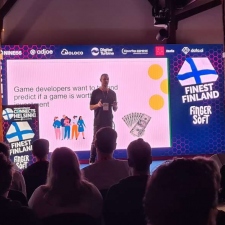Metacore’s Teppo Soininen: “Anybody who has put a game into soft launch knows th | Pocket Gamer.biz

Helsinki has long been at the forefront of the global games industry, with a particularly fine heritage in mobile. That’s why we’ve been visiting every year since 2014 for our annual Pocket Gamer Connects Helsinki two-day conference.
And this year we’re proud to be part of Finish Games Week, a week of events celebrating gaming activity within the region with PGC Helsinki 2024 taking place on October 1st to 2nd.
And in preparation for our 2024 event, we’re taking a look back at just some of the amazing speakers and sessions that took place at PGC Helsinki 2023.
So for more opportunities to network and learn from the big names in games make sure that you’re a part of PC Connects Helsinki 2024.
One key aspect of any PGC event is the talks and tracks, with individual talks by some of the game industry’s brightest and best divided into individual tracks by topic.
Teppo Soininen is the game lead at Metacore and his talk which opened the event as part of the Finest Finland track was entitled “You need to know who is going to play your game”. Metacore of course needs little introduction as the creators of viral sensation Merge Mansion.
Tried and tested
Soininen’s talk focused on testing their game concepts effectively. Iteration can be rapid and audience reaction is as fluid as it is difficult to gauge.
Soininen outlined a simple process, where a game progresses from game concept, to playable prototype and then finally onto the soft launch phase before finally being officially released. He points out that most of the time developers only find out just how well their game resonates with an audience at the soft launch stage.
Of course, for some companies – such as Supercell – soft launch is the make or break time for a game. And in the case of Supercell they’ve become well-known for their ruthless approach to axing games that don’t live up to the company’s billion-dollar legacy. However, Soininen points out that the ambition should really be for the concept stage to be where a game’s potential is understood.
For AAA titles, game development cycles can be months if not years in duration and this can easily doom a game that’s using on-trend topics, or too closely aping a hit game of the day. Once the game finally reaches storefronts it may be too late and instead find itself consigned to the dustbin of history. Instead, Soininen recommends focusing on the player’s needs, what they want and what they imagine, then translating that into feasible development.
Metacore’s own concept testing focuses strongly on iterating numerous concepts, understanding their audience and focusing on what they want to play. As the phrase goes, killing your darlings is paramount, and it’s clearly paid off for Metacore if the success of Merge Mansion is anything to go by.
Telling it like it is
“Anybody who has put a game into soft launch knows there’s still plenty of space for f*ck ups at this stage.”
As Soininen points out, while soft launch may be an exciting time, it’s also perhaps the most tense moment in a game’s life cycle because this is where the future success or failure of a game is most easily seen. He indicates that some developers shoot for soft launch, hoping this will help them iron out issues, but instead find that the concept for their game is simply not finding an audience.
It’s at best, discouraging and at worst disastrous for smaller companies who can’t afford to take their games back to the drawing board. Thus, Soininen advises, shooting for soft launch is not the right way to success. Instead constant concept testing to make sure that there’s the firmest foundation to build on is always best.
What’s the takeaway?
“The impulse for creating new games is still quite often ‘I’d like to play a game like this’,” Soininen explained. “Instead of relying on our own gut instinct we are trying to offer players something they would want to play. It’s exciting to try and find out what players want. You can get an idea of what your audience wants already at an early stage before you have written a single line of code.”
He advised developers to study their audience, figure out what they want, and to make their job into understanding and translating these concepts. A player may know what they want, but not how it can be made, and deciding if this is achievable is just as important as knowing that your audience wants it in the first place.
Teppo’s advice points to one thing, avoiding – at all costs – sinking more time than necessary into a flawed concept.
Find out more about our next event – Pocket Gamer Connects Helsinki 2024 – and how to register your interest, get tickets and take part, here.



